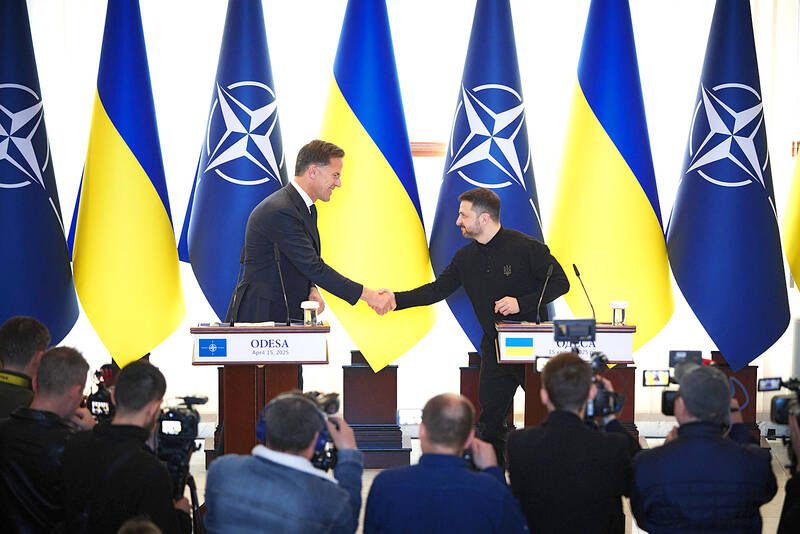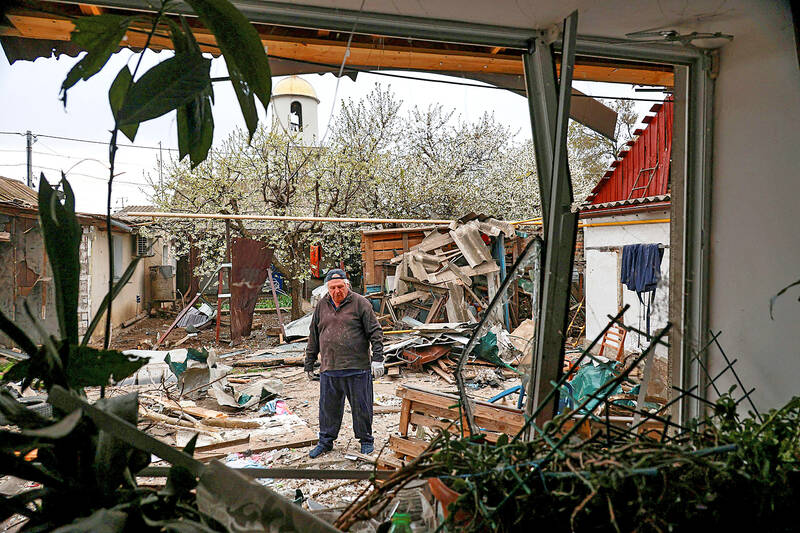Support for Ukraine remains “unwavering,” NATO Secretary-General Mark Rutte said on Tuesday, adding that more than 20 billion euros (US$22.8 billion) in security assistance has already been pledged by members of the alliance in the first three months of the year.
Rutte spoke in Ukraine’s port city of Odesa, where he met with Ukrainian President Volodymyr Zelenskiy.
His visit came days after two Russian ballistic missiles struck the city of Sumy on Sunday morning, killing at least 35 people, including two children, and injuring 119.

Photo: EPA-EFE
The attack on the northeastern city, about 30km from Ukraine’s border with Russia, marked the second large-scale attack in just over a week to result in significant civilian casualties.
Earlier this month, about 20 people were killed, including nine children, after a Russian ballistic missile struck Zelenskiy’s hometown of Kryvyi Rih on April 4.
“I’m here today because I believe Ukraine’s people deserve real peace, real safety and security in their country, in their homes,” Rutte said during a joint news conference with Zelenskiy.

Photo: Reuters
The two met with wounded Ukrainian soldiers at a hospital in Odesa.
It was Rutte’s first trip to Ukraine since US President Donald Trump assumed the lead in ceasefire negotiations between Kyiv and Moscow, which have included several rounds of talks in Saudi Arabia.
“These discussions are not easy, not least in the wake of this horrific violence, but we all support President Trump’s push for peace,” Rutte said, referring to the recent strikes.
Meanwhile, Ukraine and its European partners are continuing to develop the infrastructure for the “coalition of the willing,” which is expected to act as a long-term security guarantee aimed at deterring Russian aggression after a ceasefire is in place.
The multinational force is seen as a first test of Europe’s willingness to defend itself and its interests.
Zelenskiy said that Turkey could play a significant role in providing Black Sea security guarantees for Ukraine.
“This is not about ending the war, unfortunately,” Zelenskiy said, commenting on a security meeting being hosted by Turkey. “It’s about what comes after — the security guarantees for Ukraine following a ceasefire.”
Military representatives from Ukraine, France, the UK and Turkey were discussing the presence of a military contingent in the Black Sea as part of those guarantees, he said.
“The fact that these talks are ongoing, that we are preparing for this hopeful, soon-to-be achieved eventuality — NATO tries to steer that in the direction we think would be advisable,” Rutte said.
The meeting in Turkey, which concluded yesterday, came less than a month after the US announced that Russia and Ukraine had agreed to “eliminate the use of force” in the Black Sea.
However, key details remained unresolved, and the Kremlin has tied the deal to the lifting of some Western sanctions.
Commenting on ongoing negotiations with the US over a revised draft of an agreement that would give the US access to Ukraine’s mineral resources, Zelenskiy described last week’s technical talks in Washington as positive, with more consultations expected in the coming days.
The meeting was a technical session for expert teams and “both sides concluded the meeting on a positive note,” he said.
Zelenskiy added that online and in-person discussions would continue throughout the week, and once the teams are ready, they would present the outcomes.
Meanwhile, residents of Sumy were still mourning their loved ones killed in Sunday’s attack. Among the dead was Olena Kohut, pianist and a solo organist at the regional philharmonic. A farewell ceremony was held in the local theater where she often played.
Dozens came to say goodbye to the gifted musician and piano teacher, who was killed while on her way to rehearsals.
Mourners wept, holding red roses, as they approached her coffin at the theater, where she taught piano and mentored young musicians.
The crowd clapped in respect as her coffin was driven away and out of sight.
“The Sumy region lost a lot with her,” said Serhiy Dorofieiev, 39, director of the theater where Kohut worked.

Indonesia and Malaysia have become the first countries to block Grok, the artificial intelligence (AI) chatbot developed by Elon Musk’s xAI, after authorities said it was being misused to generate sexually explicit and nonconsensual images. The moves reflect growing global concern over generative AI tools that can produce realistic images, sound and text, while existing safeguards fail to prevent their abuse. The Grok chatbot, which is accessed through Musk’s social media platform X, has been criticized for generating manipulated images, including depictions of women in bikinis or sexually explicit poses, as well as images involving children. Regulators in the two Southeast Asian

COMMUNIST ALIGNMENT: To Lam wants to combine party chief and state presidency roles, with the decision resting on the election of 200 new party delegates next week Communist Party of Vietnam General Secretary To Lam is seeking to combine his party role with the state presidency, officials said, in a move that would align Vietnam’s political structure more closely to China’s, where President Xi Jinping (習近平) heads the party and state. Next week about 1,600 delegates are to gather in Hanoi to commence a week-long communist party congress, held every five years to select new leaders and set policy goals for the single-party state. Lam, 68, bade for both top positions at a party meeting last month, seeking initial party approval ahead of the congress, three people briefed by

The Chinese Embassy in Manila yesterday said it has filed a diplomatic protest against a Philippine Coast Guard spokesman over a social media post that included cartoonish images of Chinese President Xi Jinping (習近平). Philippine Coast Guard spokesman Jay Tarriela and an embassy official had been trading barbs since last week over issues concerning the disputed South China Sea. The crucial waterway, which Beijing claims historic rights to despite an international ruling that its assertion has no legal basis, has been the site of repeated clashes between Chinese and Philippine vessels. Tarriela’s Facebook post on Wednesday included a photo of him giving a

ICE DISPUTE: The Trump administration has sought to paint Good as a ‘domestic terrorist,’ insisting that the agent who fatally shot her was acting in self-defense Thousands of demonstrators chanting the name of the woman killed by a US federal agent in Minneapolis, Minnesota, took to the city’s streets on Saturday, amid widespread anger at use of force in the immigration crackdown of US President Donald Trump. Organizers said more than 1,000 events were planned across the US under the slogan “ICE, Out for Good” — referring to the US Immigration and Customs Enforcement, which is drawing growing opposition over its execution of Trump’s effort at mass deportations. The slogan is also a reference to Renee Good, the 37-year-old mother shot dead on Wednesday in her